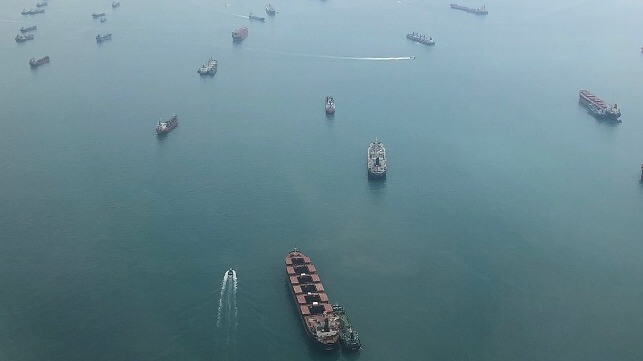Singapore Rolls Out Net-Zero Regs for Harbor Craft Beginning in 2030

As part of a broader portfolio of decarbonization measures, Singapore's port authority plans to require newbuild harbor craft to be net-zero ready in less than a decade.
Beginning in 2030, all new harbor craft operating in Singapore's port must be fully electric, or be capable of using B100 (straight) biofuel, or be compatible with net-zero fuels such as hydrogen. By 2050, Singapore wants all harbor craft to operate with net-zero emissions.
"The transition to a sustainable future will take time. We need to start now to achieve our 2050 net zero emissions targets," said Senior Minister of State for Transport Chee Hong Tat in a parliamentary address on Friday.
The minister emphasized the progress that MPA Singapore has made in encouraging electrification. Pilot programs for the port's first full-electric ferry and first full-electric lighter craft are on schedule to begin this year. MPA is also launching a charging station plan to support electric vessel operations, and the first location will begin operating at Shell's facility on Pulau Bukom in a few months' time. The agency is putting together a broader charging station plan covering more locations, and that roadmap will be completed in 2025.

that matters most
Get the latest maritime news delivered to your inbox daily.
Singapore's progress on net-zero operations drew praise from environmental activists on the other side of the Pacific. "“We applaud Singapore’s commitment to move towards 100% zero-emission port and ships through its 2050 net zero emissions targets. This transition requires a jumpstart this decade, and harbor craft are a great place to start. Fossil-fueled harbor crafts - including ferries, tugboats, crew and supply boats, fishing vessels, excursion vessels and others - produce air quality pollutants and GHG emissions that warm our planet," said Allyson Browne, climate campaign manager for ports at Pacific Environment.
To meet Singapore's 2030 standard, operators may not need to make a significant change in equipment for their newbuilds: modern diesel engines are already capable of using at least one form of straight biofuel without any modification. Renewable diesel, made by refining vegetable oil in the same hydrocracking process used for petroleum diesel, meets all specifications for diesel and is considered a drop-in replacement. First-generation biodiesel is more common than renewable diesel and can also be consumed straight (B100) in most diesel engines, but it is rarely used unblended in practice.
